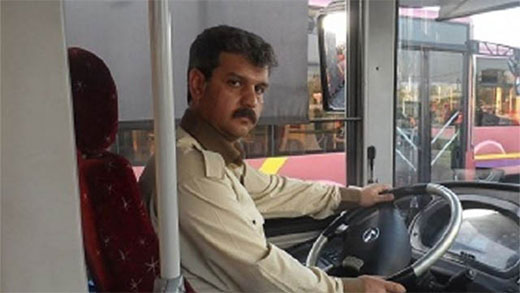
Labor activist Mohammad Jarrahi died in October 2017 from thyroid cancer that was left untreated while he was held as a political prisoner in Iran’s Tabriz Prison. In September 2015, Jarrahi’s colleague Shahrokh Zamani died of a heart attack after being denied medical care in Rajaee Shahr Prison.
December 19, 2017—The Iranian judiciary should immediately free ailing trade unionist Reza Shahabi, who recently suffered a stroke in Rajaee Shahr Prison, and allow him to receive full medical attention, the Center for Human Rights in Iran (CHRI) said in a statement today.
Shahabi, a board member of the Union of Workers of the Tehran and Suburbs Bus Company (UWTSBC), was denied hospitalization after the stroke, according to a statement by the UWTSBC published on December 14, 2017.
“During a prison visit on Wednesday [December 13, 2017], his relatives noticed that the left side of Shahabi’s face was drooping and that his left eye had sunken in,” reported the UWTSBC. “He said that when he went to the prison clinic, the doctor told him he had suffered a mild stroke.”
Political prisoners in Iran are singled out for harsh treatment, which often includes denial of medical care.
“Repeatedly we hear of political prisoners suffering irreversible consequences after being denied medical care in Iranian prisons,” said CHRI’s Executive Director Hadi Ghaemi.
“There seems to be no limit to how far the judiciary will go in punishing Iranian citizens for engaging in peaceful activism,” said Ghaemi.
Labor activist Mohammad Jarrahi died in October 2017 from thyroid cancer that was left untreated while he was held as a political prisoner in Iran’s Tabriz Prison. In September 2015, Jarrahi’s colleague Shahrokh Zamani died of a heart attack after being denied medical care in Rajaee Shahr Prison.
On numerous occasions, intelligence organizations and the judiciary have treated labor activism as a national security offense in Iran. Independent labor unions are not allowed to function, strikers are often fired and risk arrest, and labor leaders are consistently prosecuted under catchall national security charges and sentenced to long prison terms.
A source with contacts inside Rajaee Shahr Prison in the city of Karaj where Shahabi is being held told CHRI on December 14 that Shahabi required medical attention before the stroke occurred.
“Shahabi has been suffering from frequent headaches, nose bleeds, and difficulty moving his hands, feet, and neck,” said the source who asked not to be identified for security reasons.
A board member of the UWTSBC, Shahabi, 45, was arrested in June 2010 and sentenced to six years in prison after being convicted of “propaganda against the state” and “assembly and collusion against national security” for peacefully advocating labor rights in Iran. He was also banned from engaging in civic activism for five years.
In September 2014, Shahabi was granted medical leave but nearly three years later was informed that the time he had spent outside the prison on medical furlough was not counted as time served and that he would have to return to the prison.
When Shahabi returned to Rajaee Shahr Prison on August 8, 2017, he was told he would have to serve the five months that remained of his sentence before he was released on furlough, as well as a year for his alleged role in a clash between guards and prisoners in Evin Prison on April 17, 2014, that left many prisoners injured.
“In addition to denying detainees in political cases their full due process rights, Iran’s judiciary is denying them medical care,” said Ghaemi.
“It’s long past due for the Rouhani government to follow through on its election campaign promises and demand the judiciary and security forces stop trampling on citizens’ rights,” he added.
For interviews, contact:
Hadi Ghaemi
+1-917-669-5996
hadighaemi@iranhumanrights.org
Visit our website: www.iranhumanrights.org
